Here is a basic stack implementation code. However, it generates signal abort.
int *arr;
int size = 2;
int top = 0;
int pop() {
int i;
if (top <= size / 4) {
int *arr2 = (int*)malloc(sizeof(int) * size / 2);
for ( i = 0; i < size; i++)
arr2[i] = arr[i];
free(arr);
arr = arr2;
size /= 2;
}
return arr[--top];
}
void push( int a) {
int i;
if (top >= size) {
int *arr2 = (int*)malloc(sizeof(int)*size * 2);
for ( i = 0; i < size; i++)
arr2[i] = arr[i];
free(arr);
arr = arr2;
size *= 2;
}
arr[top++] = a;
}
Here is the output:
*** glibc detected *** a.out: free(): invalid pointer: 0x0804a030 ***
and the debug data shows aborted sig 6 The interesting thing is that it shows the line of free() but As 4386427 said, the problem is accessing out of bounds of memory while copying arr2 of size
0 0xffffe410 in __kernel_vsyscall ()
1 0xb7e8a7d0 in raise () from /lib/libc.so.6
2 0xb7e8bea3 in abort () from /lib/libc.so.6
3 0xb7ebff8b in __libc_message () from /lib/libc.so.6
4 0xb7ec5911 in malloc_printerr () from /lib/libc.so.6
5 0xb7ec6f84 in free () from /lib/libc.so.6
6 0x080484a0 in pop () at stacks_eng.c:14
7 0x0804867e in main () at stacks_eng.c:55 (gdb) f 6
6 0x080484a0 in pop () at stacks_eng.c:14 14 free(arr);
